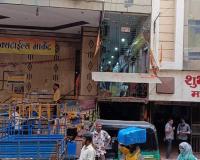Textile Industry Seeks Immediate Relief from BIS Norms, Warns of Production and Employment Crisis

Surat: Representatives of India’s textile industry have urged the central government to provide immediate relief from the rigid implementation of the Bureau of Indian Standards (BIS) norms, which they claim are adversely affecting production, employment, and global competitiveness. Bharat Gandhi, Chairman of the Textile Committee under the Ministry of Textiles, has communicated these concerns to Union Textile Minister Giriraj Singh through a formal letter.
According to the letter, while the policy may have been introduced with positive intentions, its abrupt execution has created serious operational and financial challenges for the textile sector. Gandhi, who also serves as the President of the Federation of Indian Art Silk Weaving Industry (FIASWI), highlighted several key issues affecting the industry.
One of the primary concerns is the sharp decline in textile production due to delays in the import of machinery caused by the BIS certification process. The resulting disruptions in production have directly impacted overall productivity and performance in the sector. Small and medium enterprises (SMEs), in particular, are struggling under the financial burden of compliance with the new norms.
The letter also pointed out that complications and delays in securing BIS certification are discouraging international machine tool manufacturers from partnering with Indian firms. This has created barriers to the import of advanced technology, further stalling progress.
The textile industry, being one of the largest employment generators in the country, is witnessing job insecurity as the availability of machinery diminishes and production slows. This has raised alarms about the livelihood of thousands of workers who depend on the industry.
India's position in the global textile market is also under threat. The shortage of machinery and stringent regulatory standards could push India behind competing nations like China, Bangladesh, and Vietnam. The industry fears that such disadvantages will erode India’s share in international markets.
Adding to the concerns is the impact on trade exhibitions. The upcoming Surat International Textile Machinery Expo (SITME 2025) in Ahmedabad had to be postponed due to the lack of clarity surrounding BIS regulations, underlining the urgency and seriousness of the situation.
In response, the textile sector has put forward several demands. These include a one-year transition period for the implementation of BIS norms to allow the industry time to adapt. They have also requested that international quality certifications such as CE and ISO be considered equivalent to BIS to simplify machinery imports. Additionally, the industry is seeking exemptions for specific machinery and spare parts for which domestic alternatives are unavailable.
Industry representatives emphasized that textiles form a core pillar of India’s economic framework, contributing significantly to employment, exports, and development. They have called upon the government to provide strong support and adopt a more flexible approach to ensure the sustainability and growth of this vital sector.






